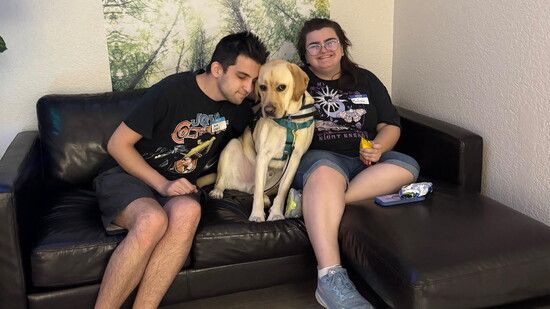With a mission is to empower teens and adults of all abilities by offering a nurturing environment, the Dream Community Center in Westlake Village is an inclusive recreation community center for adults and teens with disabilities.
“One of the important areas of focus for our center is serving adults on the spectrum. This is a huge need and we are eager to fill the gap for Conejo Valley families,” says Edlyn Peña, of Camarillo, who’s a mom to an autistic 17-year-old son, Diego.
The majority of services in California are geared toward youth, she noted. “But, as we know and expect, those youth will grow up to become adults.”
With more and more children being diagnosed with autism at a rate of 1 in 31 children, “our communities need more resources for autistic adults,” says Peña, adding that services for this population are especially important for those who require high support needs and may not be independent enough to hold their own job or career. “We cater to this population by giving them enriching programs and classes throughout the day.”
The center–founded by Peña and her business partner, Henry Panah–opened in June with a 7-week summer camp that served 26 campers who participated in age-appropriate activities and games.
“A few weeks ago we transitioned into offering a daytime program that offers classes ranging from brain games, to STEM lessons, to self-regulation and self-advocacy life skills,” Peña says. “We started off with four participants and hope to enroll more in the future.”
In the afternoons, the center offers social recreation classes, including music, art, yoga, ceramics, fitness and brain and motor games. Classes are vendored with Tri-Counties Regional Center.
“Oftentimes, minimally speaking and nonspeaking teens and adults attend programs and services where the staff may not be trained in supporting different modes of communication,” says Peña, further noting that the staff is trained in providing access to augmentative and alternative communication to minimally speaking and nonspeaking autistic teens and adults.
“This may include communication tools and devices like laminated letter boards, choice boards, keyboards and tablets with communication apps,” she explains. “It is unusual to find programs that are equipped to include participants who have different communication needs. This is important for their inclusion, participation and interactions with peers and instructors/staff.”
The Dream Community Center was inspired by Peña’s son, Diego, who will graduate from high school this June. He is nonspeaking and uses a letter board to communicate, and often requires one-on-one support to participate in activities and interact with others.
“I was terrified thinking about the lack of services and supports for people like him,” Peña recalls. “I knew I would have to coordinate his participation in a variety of college classes and community activities once he graduated, but there didn't seem to be a lot of options in our community.”
With the Dream Community Center, “Diego and his peers have more options for enrichment, age-appropriate programs and supportive staff who know how to incorporate a person who communicates differently.”
In addition to her role as CEO of the Dream Community Center, Peña is a professor and scholar who researches approaches to support the inclusion of minimally speaking autistic students in community and educational settings. She has published more than two dozen research articles, books and reports in the area of disability.
“In particular, my research focuses on exploring ways to assist neurodiverse students to access and transition into college environments, and supporting minimally speaking autistic students to access and use augmentative and alternative ways to communicate.”
The Dream Community Center “fills an important gap” in community services by providing people from Conejo Valley and beyond with fulfilling life options.
“Families from Ventura to Culver City drive all the way into Westlake Village to experience engaging, educational and fun programming,” Peña says. “We are honored to be able to create a meaningful space that is rooted in love and respect for the growing autistic community.”
Above all, she believes “all humans want relationships and purpose. Our vision is to build a community for adults and teens to have friends and a life filled with purpose.”
The Dream Community Center is located at 870 Hampshire Road, Suite X, in Westlake Village. For more information, visit DreamCommunityCenter.org.
“It is unusual to find programs that are equipped to include participants who have different communication needs."
